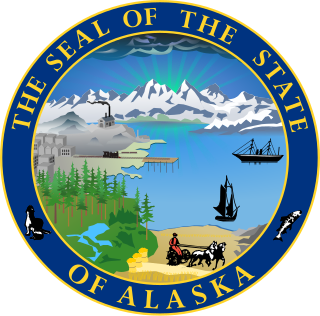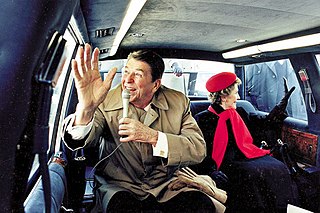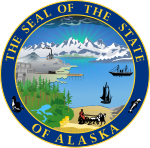
Presidential elections were held in the United States on November 3, 1964, less than a year following the assassination of John F. Kennedy, who won the previous presidential election. Incumbent Democratic President Lyndon B. Johnson defeated Republican Senator Barry Goldwater in a landslide victory. Johnson was the fourth and most recent vice president to succeed the presidency following the death of his predecessor and win a full term in his own right. Johnson won the largest share of the popular vote for the Democratic Party in history at 61.1%. As of 2024, this remains the highest popular vote percentage of any candidate since the advent of widespread popular elections in 1824.

The 1980 United States Senate elections were held on November 4, coinciding with Ronald Reagan's victory in the presidential election. The 34 Senate seats of Class 3 were contested in regular elections. Reagan's large margin of victory over incumbent Jimmy Carter gave a huge boost to Republican Senate candidates, allowing them to flip 12 Democratic seats and win control of the chamber for the first time since the end of the 83rd Congress in January 1955. This was the first time since 1966 that any party successfully defended all their own seats.

The 1958 United States Senate elections were elections for the United States Senate which occurred in the middle of President Dwight D. Eisenhower's second term. Thirty-two seats of Class 1 were contested in regular elections, the new state of Alaska held its first Senate elections for its Class 2 and 3 seats, and two special elections were held to fill vacancies.

The 1966 United States House of Representatives elections was an election for the United States House of Representatives on November 8, 1966, to elect members to serve in the 90th United States Congress. They occurred in the middle of President Lyndon B. Johnson's second term. As the Vietnam War continued to escalate and race riots exploded in cities across the country, Johnson's popularity had fallen, and the opposition Republican Party was able to gain a net of 47 seats from Johnson's Democratic Party, which nonetheless maintained a clear majority in the House. This was also the first election that occurred after the Voting Rights Act of 1965 became law, the first time since 1870 that a Republican won a House seat in Arkansas, and the first since 1876 that the party did so in South Carolina.

1914 United States House of Representatives elections were elections for the United States House of Representatives to elect members to serve in the 64th United States Congress. They were held for the most part on November 3, 1914, while Maine held theirs on September 14. They were held in the middle of President Woodrow Wilson's first term.

Thomas Beverley Evans Jr. is an American lawyer and politician from Delaware. He is a member of the Republican Party, and served three terms as U.S. Representative from Delaware.

The 2006 United States House of Representatives election in Alaska was held on Tuesday, November 7, 2006. The term of the state's sole Representative to the United States House of Representatives expired on January 3, 2007. The winning candidate would serve a two-year term from January 3, 2007, to January 3, 2009. The primary elections were held on August 22, 2006.

Although in its early years of statehood, Alaska was a Democratic state, since the early 1970s it has been characterized as Republican-leaning. Local political communities have often worked on issues related to land use development, fishing, tourism, and individual rights. Alaska Natives, while organized in and around their communities, have been active within the Native corporations. These have been given ownership over large tracts of land, which require stewardship. The state has an independence movement favoring a vote on secession from the United States, with the Alaskan Independence Party, but its membership has shrunk in recent decades.

The number of elections in Alaska varies by year, but typically municipal elections occur every year, plus primary and general elections for federal and state offices occur during even-numbered years. Alaska has a gubernatorial election every four years. Members of the state's United States congressional delegation run for election or re-election at the times set out in the United States Constitution. Primary elections assist in choosing political parties' nominees for various positions. On a regional basis, elections also cover municipal issues. In addition, a special election can occur at any time.

This is the electoral history of Ronald Reagan. Reagan, a Republican, served as the 40th president of the United States (1981–1989) and earlier as the 33rd governor of California (1967–1975). At 69 years, 349 days of age at the time of his first inauguration, Reagan was the oldest person to assume the presidency in the nation's history, until Donald Trump was inaugurated in 2017 at the age of 70 years, 220 days. In 1984, Reagan won re-election at the age of 73 years, 274 days, and was the oldest person to win a US presidential election until Joe Biden won the 2020 United States presidential election at the age of 77 years, 349 days.

The United States House of Representatives is the lower chamber of the United States Congress, with the Senate being the upper chamber. Together, they compose the national bicameral legislature of the United States. The House is charged with the passage of federal legislation, known as bills; those that are also passed by the Senate are sent to the president for signature or veto. The House's exclusive powers include initiating all revenue bills, impeaching federal officers, and electing the president if no candidate receives a majority of votes in the Electoral College.

The Alaska congressional election of 1970 was held on Tuesday, November 3, 1970. The term of the state's sole Representative to the United States House of Representatives expired on January 3, 1971. Incumbent Howard Wallace Pollock retired to run for Governor of Alaska. The winning candidate would serve a two-year term from January 3, 1971, to January 3, 1973. Nick Begich defeated former Alaska Commissioner of Economic Development & Anchorage banker Frank Murkowski, by a margin of 10.2%.

The 1968 United States presidential election in New Mexico took place on November 5, 1968. All fifty states and The District of Columbia, were part of the 1968 United States presidential election. State voters chose four electors to represent them in the Electoral College, who voted for president and vice president.

The 1968 United States presidential election in Alaska took place on November 5, 1968, as part of the nationwide presidential election. Voters chose three representatives, or electors to the Electoral College, who voted for president and vice president.

The 1960 United States presidential election in Alaska took place on November 8, 1960, as part of the nationwide presidential election. This was the first presidential election that Alaska participated in. Voters chose three representatives, or electors, to the Electoral College, who voted for president and vice president.

The 1970 United States Senate special election in Alaska was held on November 3, 1970, to fill a seat in the United States Senate following the December 1968 death of Democrat Bob Bartlett, who had been Alaska's senior Senator since statehood in 1959. Republican Ted Stevens was appointed to the seat temporarily on December 24, 1968, to serve until the election could be held.

The 1960 United States Senate election in Alaska was held on November 8, 1960. Despite Republican Presidential candidate Richard Nixon defeating John F. Kennedy in the state by a close margin, popular incumbent Democratic U.S. Senator Bob Bartlett was re-elected to a full term in office, defeating Republican dentist Lee McKinley.

The 1968 United States presidential election in Hawaii took place on November 5, 1968. All 50 states and the District of Columbia, were part of the 1968 United States presidential election. Hawaii voters chose 4 electors to the Electoral College, which selected the president and vice president.

Since Alaska's admission to the Union in January 1959, it has participated in 16 United States presidential elections, always having 3 electoral votes. In the 1960 presidential election, Alaska was narrowly won by the Republican Party's candidate and incumbent vice president Richard Nixon, defeating the Democratic Party's candidate John F. Kennedy by a margin of just 1.88%. In the 1964 presidential election, the Democratic Party's candidate Lyndon B. Johnson won Alaska in a national Democratic landslide victory. Since the 1964 election, Alaska has been won by the Republican Party in every presidential election. However, no Republican candidate has gotten 55% of the statewide vote since 2008. Donald Trump received 54.5% in 2024.

The 1968 United States presidential election in Nevada took place on November 5, 1968, as part of the 1968 United States presidential election. State voters chose three representatives, or electors, to the Electoral College, who voted for president and vice president.























